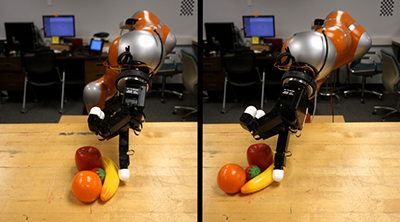Congratulations to robotics faculty Prof. Hermans for receiving new NSF CRII award for $175,000. The project is titled, “CRII: RI: Enabling Manipulation of Object Collections via Self-Supervised Robot Learning”
Project ABSTRACT: 
While manipulation of individual objects in cluttered, real-world settings has received substantial attention, the problem of directly manipulating collections of objects has been left unexplored. This project investigates to what extent robots can autonomously manipulate such object collections. This project facilitates autonomous manipulation methods suitable for use in home robotic assistants. Such assistive robots stand to make a substantial impact in increasing the quality of life of older adults and persons with certain degenerative diseases. Additionally, the robot skills investigated in this project are suitable for manipulation in areas damaged in natural or man-made disasters, where building rubble and other debris need to be cleared. The project supports the development and presentation of an interactive robotics lecture for low-income school children, teaching them fundamentals of computer programming.
The research goal of this project is to enable robots to manipulate and reason about groups of objects en masse. The hypothesis of this project is that treating object collections as single entities enables data-efficient, self-supervised learning of contact locations for pushing and grasping grouped objects. This project investigates a novel neural network architecture for self-supervised manipulation learning. The convolutional neural network model takes as input sensory data and a robot hand configuration. The network learns to predict as output a manipulation quality score for the given inputs. When presented with a novel scene, the robot can perform manipulation inference by evaluating the current sensory data, while directly optimizing the manipulation score predicted by the network over different hand configurations. The project supports the development of experimental protocols and the collection of associated data for dissemination to stimulate research activity in manipulation of object collections.
